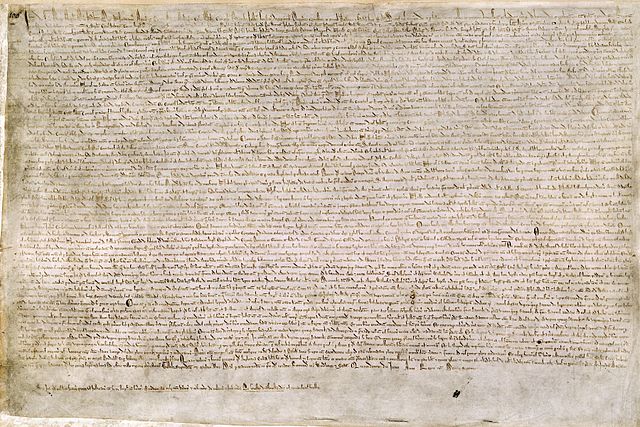[Image above: British Library Cotton MS Augustus II.106. Credit.]
The 800th anniversary of Magna Carta has prompted a lot of discussion around the world about how the document has influenced law and government in the centuries since it was signed—but even in 1215, Magna Carta was being discussed outside of England.
One of the key figures whom I discuss in my dissertation is Gervais, who was abbot of a succession of Premonstratensian houses—Saint-Just-en-Chaussée, Thenailles, and then Prémontré itself from 1209-1220—before serving as bishop of Séez from 1220-28. Though his ecclesiastical career led him to northern France, Gervais was English by birth. Charles-Louis Hugo, the great Premonstratensian antiquarian writer of the early eighteenth-century, described Gervais as being origine Lincolniensis, sanguine clarus, though we know nothing more of Gervais or his origins than that.1
While my interest in Gervais centres mostly on his other activities in 1215—he travelled to Rome to participate in the Fourth Lateran Council, which gave him encouragement for his reformist agenda which seems to have been so central in shaping the direction of the Premonstratensian Order for the rest of the thirteenth century—even amidst all his other duties, Gervais was following the events unfolding back in his country of birth. In 1215, Gervais wrote to archbishop Stephen Langton of Canterbury about Magna Carta.2
The letter is undated but was probably composed in July or August, since Gervais knew that an agreement had been reached between King John and the rebels, but didn’t yet know of the renewal of the civil war or of the pope’s condemnation of Magna Carta. The letter doesn’t provide any new insights into the circumstances surrounding the composition of Magna Carta, but it does give us a rare insight into how the conflict in England was perceived by an Englishman and an ecclesiastic, one who had lived overseas for many years but who still had strong ties there. Gervais urged moderation in the church’s interaction with the crown—perhaps unsurprisingly, given both the Premonstratensians’ history of maintaining strong ties with royal administrations, and given Gervais’ own insistence on the importance of hierarchical structure within his order.
You can find the full text of the letter embedded below:
This was not the only time when the baronial rebellion was mentioned by Gervais. He twice wrote to the papal legate in England, Guala Bicchieri, asking among other things for leniency for those English Premonstratensians who had sided with the rebels and been excommunicated. In the second of these letters, Gervais made reference to a failed attempt at a “three-fold” peace (triplex forma pacis) which was proposed by the papacy but which Gervais evidently thought would have been shameful.3 Given Gervais’ strong relationship with successive popes, and the wide geographical range of Premonstratensian houses in this period, it’s not a surprise that even in Picardy, far from the ongoing diplomatic negotiations, Gervais had knowledge of them.
Gervais also wrote a letter in the summer of 1216 to Simon of Maugastel, archbishop of Tyre, at a time when the future Louis VIII of France had invaded southern England. The text reveals Gervais’ less-than-cordial thoughts about the clergy who had sided with the baronial party: “I’m greatly upset that when England was on the brink of peace, it was hindered by merely four clerics—would that they had never learned their letters!”
Footnotes
1 He has sometimes been referred to as Gervais/Gervase of Chichester or Gervaise/Gervase of Chester, but C.R. Cheney showed that this was based on a confusion on the part of Jean Le Paige in the seventeenth century. See C.R. Cheney, “Gervase, Abbot of Premontre: A Medieval Letter-Writer.” Bulletin of the John Rylands Library 33, no. 1 (1950): 25–56. We do however know that a relative of Gervais’, Bartholomew, was also a Premonstratensian canon who transacted business in Italy on Gervais’ behalf.
2 The dispute over Langton’s election to the episcopate was of course one of the causes behind the conflict which led to Magna Carta. See Langton’s entry in the Dictionary of National Biography.
3 “Triplex forma pacis quae, ut dicitur, a sede apostolica emanavit, quarum quaelibet, si fuisset ad effectum perducta, in totius ecclesiae et vestram nihilominus ignomimam redundasset.”
